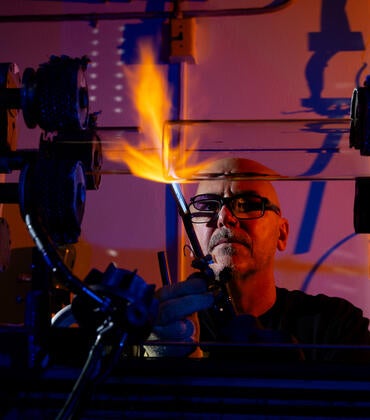The skin of electronic cigarette, or EC, users can come into direct contact with refill fluids through leakage and spills as well as the touching of surfaces that have EC-exhaled aerosol residue, or ECEAR. Nonusers are not spared this risk either for they may be passively exposed, via the skin, when occupying indoor environments with ECEAR deposits.
A research paper published in the journal Toxicology in Vitro now concludes that EC users and employees at vape shops should be aware that harm could be caused by handling refill fluids and leaky ECs or by touching ECEAR, found on all surfaces in vape shops.
The researchers, led by Prue Talbot, a professor of cell biology at UC Riverside, and Careen Khachatoorian, a former postdoctoral researcher in Talbot’s lab, evaluated the responses of human epidermal cells, called keratinocytes, and a 3D tissue model of the human epidermis to EC refill fluids, flavor chemicals, and ECEAR.
They identified the flavor chemicals in two popular brands of refill fluid, tested these products and their flavor chemicals using both submerged cultures of human keratinocytes and a 3D air-liquid interface model, and evaluated the effects of ECEAR extracts on these skin models.
“We found EC chemicals can cause oxidative damage and inflammation to human skin,” Khachatoorian said. “Our data could provide a basis for restricting vaping in indoor environments. With the world-wide increase in EC use, it is important to expand future research on dermal exposure to include additional refill fluids, nicotine concentrations, flavor chemicals, and ECEAR concentrations.”
Khachatoorian cautioned that new EC products in the market may not be vetted for toxicity.
“We won’t know the true long-term biological effects of EC use until it is too late for users, just like we didn’t know the effects of cigarette use in the 1950s,” she said.
Khachatoorian defended her doctoral dissertation in December 2020. She worked as a postdoctoral researcher at UCR for six months thereafter, starting in July 2021 as a toxicologist and study director at the Institute for In Vitro Sciences in Maryland.
Talbot and Khachatoorian were joined in the research by Wentai Luo, Kevin J. McWhirter, and James F. Pankow of Portland State University in Oregon.
The research, which was all done at UCR, was supported by grants from the Tobacco-Related Disease Research Program of California, the National Institute of Environmental Health Sciences, the Food and Drug Administration Center for Tobacco Products, and an Armenian Engineers and Scientists of America Scholarship. The content of the research paper is solely the responsibility of the authors and does not necessarily represent the granting agencies’ official views.
The research paper is titled “E-cigarette fluids and aerosol residues cause oxidative stress and an inflammatory response in human keratinocytes and 3D skin models.”
Thumbnail photo: Don Delfin Almonte on Unsplash






